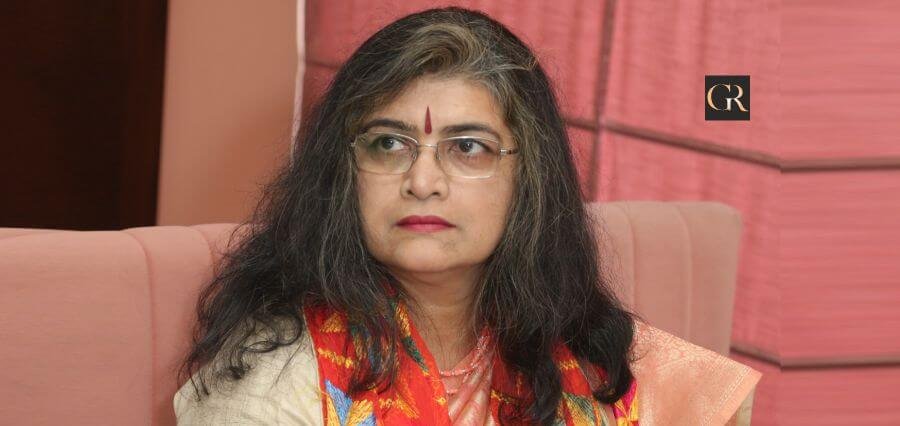Inspirational women in Gujarat are leading visionary change in various sectors, ranging from grass-root activism to entrepreneurship and governance, setting strong precedents for inclusive development. Among these pioneers is Kumud Verma, who is a doyen of Indian letters. Her career effortlessly intertwines intellectual engagement and community-focused social activism. One can see her unshakeable passion for education, women’s empowerment, and governmental reform in both her extensive writing and her active pursuit of changing society.
Strongly equipped academically in education and social work, Kumud Verma has spent her career spearheading reforms while writing books that explain but don’t merely tell they present thoughtful templates for rethinking social organization, leadership, and community activity. Through her many-faceted efforts, she continues to shape the intellectual and social fabric of India, tackling intricate issues ranging from governance to parenting and motivating subsequent generations to shatter obstacles and initiate change.
Gujarat Review had an opportunity to sit down and have an insightful conversation with Kumud. In this interview, she talks about her professional journey, achievements, challenges, and future plans. Following are the excerpts from the interview:
Can you share your journey what pivotal moments shaped your path to where you are today?
Whatever I am today, it was a long journey. The first pivotal moment was when I started a small school to help children in my neighbourhood. I was just fifteen years old then. When I interacted with the students and their parents who were from not very comfortable economic background, I penned down their challenges, expectations and requirements. Very soon the school started growing and I had to bring in more teachers. The conversations with the students and parents helped me to enhance the teaching skills of the teachers in my school. It was published in the form of a book. This book was later declared a bestseller. That motivated me to work on issues related children, adolescents and parents.
What does be recognized as one of Gujarat’s most influential women in 2025 mean to you personally and professionally?
It means a lot to me. This tells me that as a woman, the work done by me, brings a considerable change in the society and catches the attention of the public. It also validates that the effort is in the right direction and motivates me to work further in the same direction.
In your opinion, what are the most pressing challenges Gujarat faces today, and how are you contributing to addressing them?
There are variety of challenges in the society and the people of Gujarat are also facing the same. The foremost amongst them standards of education.
Secondly, there is a widespread migration of families from rural areas to the cities to provide better education to children and improve ‘quality of life’ of family members. However, this is resulting in more nuclear families. In such cases young parents do not have advice of the elderly available to support the growth of growing children. There is a need to handhold young parents, especially mothers, so that they can guide the children properly.
I have been writing different books on the related issues. I have addressed the issues by writing motivational books for teachers and parents.
Leadership often requires tough choices. Can you describe a decision that tested your resolve and how you navigated it?
I got associated with a very reputed chain of schools in Gujarat as Academic counsellor and subsequently, was handed the responsibility to manage a school. However, I realized that this responsibility would limit my sphere of influence, and I will be limited to one school. I moved on and started conducting workshops and counselling sessions for teachers and parents.
I think that if I had not made that choice, I would not have created the kind of impact that I have made today.
How do you balance tradition and progress in a state so deeply rooted in culture yet rapidly evolving in innovation?
Gujarat is a unique state. Here, you will see families with all modern amenities, yet you see multi-generation families living together in same building or blocks. A very high proportion of the population lives abroad yet they come back to India, at least once a year. Even if they stay abroad, they do not forget their favourite food, or their rituals such as Raas and Garba.
Whenever I share my views I stress on importance of our culture, traditions and the value of relationships. I recall a statement made by a stateman long ago (I am unable to recall the name) that the newness should be such that it looks that it has evolved from the old and not that newness has been pasted on the old.
What role do women leaders play in defining Gujarat’s economic, social, or political future?
Gujarat has given birth to great women leaders. Whenever people talk about Mahatma Gandhi, Kasturba is also remembered and revered. Elaben Bhatt has created a mass movement of women in Gujarat. We had dynamic women chief minister like Anandi Ben Patel.
The AMUL movement was a product of thousands of women who worked to make AMUL as a large multinational brand. Today they influence all spheres of society whether economic, social and political.
Have you faced any gender-based challenges in your field, and how did you overcome them?
As an author I did not face any gender-based challenges in my field. But when I go out for a social work in the society, I face such biases to some extent. I conduct meetings with entire family and convince the male counterpart of the family and take their help.
Mentorship is crucial for growth. Who have been your mentors, and how are you mentoring others now?
Yes, indeed mentors are very important. They are like lamps who show path to others. When I started my work, it was totally based on my intuition. My parents were there to talk and discuss and slowly when I grew up with my own experiences. I had enough to tell others.
Subsequently, when I enrolled for my course work towards ‘bachelor’s in education’, one of my teachers in the college was very elderly and guided me to become a good communicator. He continued to guide me for a very long time, ever after I completed my graduation.
Later, when I shifted to Ahmedabad, I had the blessings to get guidance from luminaries in the file of literature such as Dr. Amba Shankar Nagar ji.
Now, I do a lot of counselling to young children and parents. Many times, young children or adults do not find a channel to talk to their parents. I help them to understand the challenges of life and to overcome the inhibitions and challenges they are facing. I spend lot of time with them either in person or online to talk to them.
What message would you give to young women in Gujarat aspiring to lead change in their communities or industries?
Recently I met a group of women who are members of an NGO. This NGO is dedicated towards uplifting of women and their families from the jaws of poverty. They are trying their best to change impact the economic status in a positive manner but are constrained due to lack of training and education. There are many women who are in the same situation. Therefore, my message to the young women in Gujarat is that they should get the best education and use that education to start social entrepreneurship ventures. Hence, they should become job-providers and uplift several other women from the clutches of poverty, illiteracy and misery.
Looking ahead to the next decade, what is your vision for Gujarat and your role in shaping it?
I wish that Gujarat should develop in all the fields: social and economic. It should be a state respected for gender and social equality. The industries should be developed while keeping the environment of the state. Migrant labour that comes from other states should get due reward and feel that justice has been done for their hard work. It should be a place with blessings of Maa Laxmi and Maa Saraswati. All communities should dance around Maa Amba during Navratri.




